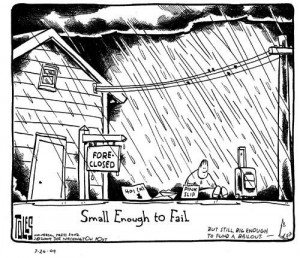Are Banks Evil?
 I think banks are a necessary evil, but banks do not necessarily have to BE evil. There is a school of thought developing that banks should be more like public utilities and simply serve the public.
I think banks are a necessary evil, but banks do not necessarily have to BE evil. There is a school of thought developing that banks should be more like public utilities and simply serve the public.
There is a move underfoot that is doing just that in a few states across the country. Ellen Brown has been covering this story extensively. Please enjoy this article. It is both well done and enlightening.
–Greg Hunter–
—————————————–
FEDS TO STATES: “DROP DEAD.”
By Ellen Brown, Guest Writer for USAWatchdog.com
“Ford to New York: Drop Dead,” said a famous headline in 1975. President Ford had declared flatly that he would veto any bill calling for “a federal bail-out of New York City.” What he proposed instead was legislation that would make it easier for the city to go bankrupt.
Now the Federal Treasury and Federal Reserve seem to be saying this to the states, which are slated to be the first ritual victims in the battle over the budget ceiling. On May 2, Treasury Secretary Timothy Geithner said that the Treasury would stop issuing special securities that help state and local governments pay for their debt. This was to be the first in a series of “extraordinary measures” taken by the Treasury to avoid default in the event that Congress failed to raise the debt ceiling on May 16. On May 13, the Secretary said these extraordinary measures had been set in motion.
The Federal Reserve, too, has declared that it cannot help the states with their budget problems — although those problems were created by the profligate banks under the Fed’s purview. The Fed advanced $12.3 trillion in liquidity and short-term loans to bail out the financial sector from the 2008 banking collapse, 64 times the $191 billion required to balance the budgets of all 50 states. But Fed Chairman Ben Bernanke declared in January that the Fed could not make the same cheap credit lines available to state and local governments — not because the Fed couldn’t find the money, but because it was not in the Fed’s legislative mandate.
The federal government can fix its own budget problems by raising its debt ceiling, and the too-big-to-fail banks have the federal government and Federal Reserve to fall back on. But these options are not available to state governments. Like New York City in 1975, many states are teetering on bankruptcy.
A Beacon in the Storm
Many states are in trouble, but not all. North Dakota has consistently boasted large surpluses, aided by a state-owned bank that is showing landmark profits. On April 20, the Bank of North Dakota (BND) reported profits for 2010 of $62 million, setting a record for the seventh straight year. The BND’s profits belong to the citizens and are produced without taxation.
Inspired by North Dakota’s example, twelve states have now introduced bills to form state-owned banks or to study their feasibility. Eight of these bills have been introduced just since January, including in Oregon, Washington State, Massachusetts, Arizona, Maryland, New Mexico, Maine and California. Illinois, Virginia, Hawaii and Louisiana introduced similar bills in 2010. For links, dates and text, see here.
The Center for State Innovation, based in Madison, Wisconsin, was commissioned to do detailed analyses for Washington and Oregon. Their conclusion was that a state-owned bank on the model of the Bank of North Dakota would have a substantial positive impact on employment, new lending, and government revenue in those states.
The BND partners with local banks in providing much-needed credit for local businesses and homeowners. It also helps with local government funding needs. When North Dakota went over-budget a few years ago, according to the bank’s president Eric Hardmeyer, the BND acted as a rainy day fund for the state; and when a North Dakota town suffered a massive flood, the BND provided emergency credit lines to the city. Having a cheap and readily available credit line with the state’s own bank reduces the need for massive rainy-day funds that are a waste of capital and are largely invested in out-of-state banks at very modest interest.
What States Can Do with Their Own Banks
North Dakota has a population that is less than 1/10th the size of Los Angeles. The BND produced $62 million in revenue last year and $2.2 billion in loans. Larger states could generate much more.
Banks create “bank credit” from capital and deposits, as explained here. The Bank of North Dakota has $2.7 billion in deposits, or $4000 per capita. The majority of these deposits are drawn from the state’s own revenues. The bank has nearly the same sum ($2.6 billion) in outstanding loans.
You can get a rough idea of what a state bank could do for your state, then, by multiplying the population by $4,000. California, for example, has 37 million people. If it had a state-owned bank that performed like the BND, it might amass $148 billion in deposits. This $148 billion could then generate $142 billion in credit for the state, assuming the bank could come up with $12 billion in capital to satisfy the 8% capital requirement imposed on banks.
Note that this capital would not be an expenditure. It would just be an investment; and like any capital investment, it would actually make money for the state. The Bank of North Dakota has had a return on equity in recent years of 25-26%, and a major portion of this has been returned to the state treasury. All states have massive rainy day funds of various sorts. Some of this money could simply be shifted into equity in the state’s own bank.
There are many options for using the state’s credit power, but here is one easy alternative that illustrates the cost-effectiveness of the approach. Assume California’s state-owned bank invested $142 billion in municipal bonds at 5% interest. This would give the state $7 billion annually in interest income. California has outstanding general obligation bonds and revenue bonds of $158 billion, and $70 billion goes for interest. If California had been funding its debt through its own bank for the last decade or two, it would have saved $70 billion on its bonded debt and would be that much richer today.
In a futile attempt to “balance the budget” in a shrinking economy, we have been pressured into a self-destructive economic model in which the only alternatives are said to be to slash services, raise taxes, and sell off public assets. These are not our only alternatives. What destroyed our local economies was not excess government spending but was a credit crisis on Wall Street. We can restore the prosperity we lost by restoring credit in the state; and we can do that by taking our deposits out of Wall Street banks and putting them in our own state-owned bank, to be leveraged into credit for local purposes. For more information, see here.
——————————————————————————————————–
Ellen Brown is an attorney and president of the Public Banking Institute, http://PublicBankingInstitute.org. In Web of Debt, her latest of eleven books, she shows how a private cartel has usurped the power to create money from the people themselves, and how we the people can get it back. Her websites are http://webofdebt.com and http://ellenbrown.com.











Spot on! Excellent idea.
Living in rural Idaho for the past 30 years I opened my accounts with a regional bank (12 or so branches) and never looked back. Business is done on a face to face basis. You are not just a number speaking to a loan center employee. The bank has the mortgage on our home and I mean thay have it, they don’t sell paper and they don’t make questionable loans. If you are not rock solid they don’t want your business. Even in this depression, our local banks much like BND, are in great shape.
Greg we (NC) have state employee credit unions. Is this anything like the state banks that your article talks about? Is this a better type bank to be in instead of the regular big banks, and what about the smaller local banks that carter to the local community? Can they act like the banks that are in N.D.?
Gary,
I like credit unions very much. They do not securitize debt, and make much less risky investments overall. The banks should not be your main long term concern–it’s the U.S. dollar and its inflation to infinity path. You need to plan on a dollar calamity at some point. There are $12 dollars held outside of the U.S.
Greg
Tyranny at the Treasury Department or How I Learned to Love the Debt Bomb.
It would be my guess that both the two headed beast of Repulicrats in Congress and Tiny Tim the tax cheat at Treasury are breathing a collective sigh of relief at the moment. They just rolled out the opening precedent for the largest theft in history and the public’s response so far has been; “the Govonator did what?” Between Arnold’s peccadilloes and those of IMF chief Strauss-Kahn they could have not asked for a better cover for or distraction from this grand little scheme.
Maybe someone should check Geithner’s phone and email logs to see how long it took Helicopter Ben at the FED and his good buddy Blankfein at Goldman Sachs to call in their congratulations. I’d bet the first line was something like: “Debt ceiling? We don’t need no stinking debt ceiling!”
Getting pushed up against the legislative limits, rather than actually cutting off some of the bureaucrats budgets Treasury announces that it will start “borrowing against” the pension funds of Federal employees. They further assured us saying that there was no reason to worry because the Treasury was “legally” required to pay back those funds as soon as they became available under any new increase in the debt ceiling. The justification for this little sleight of hand was that that the pension funds are held in government controlled accounts. In reality the Treasury Department is simply converting whatever equities held by those funds into Treasury bonds. The banks collect huge fees for conducting the transactions, they kick back the pocket change to the politicians in campaign contributions, everybody keeps their mouth shut, and the powers that be laugh at the rest of us while making their deposits in off shore accounts.
So how much is in those accounts? What 2 – 3 trillion or so? Well that should be enough to keep up the spending charade for the next year or so while the public is kept distracted by the so-called “battle” over the budget and any debt ceiling legislation. Anyone who thinks this is anything but the first round in an even bigger scam to come is either stupid or already works for a politician or investment bank. With those monies now fully under their control, the Eye of Sauron will next fall upon that fat and inviting $10 trillion or so sitting in private IRA and 401k accounts. Well stealing from government employees is one thing right but how could they justify stealing private funds you say? Herein lays the all powerful and ubiquitous “commerce clause.” I can hear it already, “Well you see the government has done you the favor by allowing you to save all that money without letting Shylock, I’m mean the government taking its ‘fair share’ through taxation. So at least, what 30% – 40%, is actually the government’s money and not yours.” It will kind of be like the Germans marching into the Sudetenland, they got their foot in the door, took what they said they were entitled too and after a short breather gobbled up the rest of Czechoslovakia.
Hey it worked for Greece didn’t it? It’s working in Spain right? The NY Times and the Washington Post aren’t running any front page stories on renewed riots in Greece or street protests in Madrid so they’re either not happening or there just not that important , right?
It’ hard to believe that Congress or the Obama Administration are serious about actually cutting the profligate spending. They both know that if they do, that number will come straight off the top of the GDP. But then maybe that’s part of the plan. The GDP falls, the market panics, the FED has it’s excuse for QE3, the FED loans even more money to Wall Street at 0%, they then buy up collapsing equities at bargain basement prices, the market goes back up and voila, problem solved! Better yet another couple of trillion dollars previously held by private individuals and pension funds are now in the hands of the Blankfein and friends and those now liquid funds are now ripe for the picking and conversion into Treasury Bonds!
So instead of complaining all you ingrates need to be thankful for the wizardry of the banks that have saved the economy once again! Hey those T-Bills are going to make wonderful wallpaper for your luxury one room retirement condo. That is if you don’t use them all for the toilet paper you won’t be able to afford first!
why does the state have to own and manage the bank, what is wrong with privately owned banks exposed to the full force and fury of free market forces. Without things like an FDIC (which is a grossly underfunded sugar pill anyway) people would hopefully pay more attention to who they trust their money with and not just look at the promised returns.
I live in Illinois and I can say for sure that this state would not be as prudent as ND, especially when it comes to “rainy days”, given how they handle casino and lottery revenues, the potato heads running my state would raid our bank on a whim until our fat governor had to be trotted out yet again and tell us taxes need to be raised to avoid laying off every state cop and emptying every prison in the state.
I think government spending is the problem, the less money they have at their finger tips the better, and while it may or may not be the amount of money the government spends it is the way it is spent that ruins the entire system by undermining the work ethic, hampering business and feeding a culture of corruption which is taken for granted here in Illinios.
1) The Fed is evil. The IMF is evil and so is The World Bank. The axis of the oligarchy that forms this banking triumvirate and those that conspire to sustain it as a feasible model – Wall Street, our “Government Leaders”, and The Media – is pure evil. But banks that operate in the manner described here are not.
2) “What destroyed our local economies was not excess government spending but was a credit crisis on Wall Street.” Our economy has been wrecked – our money consistently pilfered – by a corrupt system specifically set up to keep the public indebted and the banking elite in charge.
3) “…taking our deposits out of Wall Street banks and putting them in our own state-owned bank, to be leveraged into credit for local purposes” – PLEASE, I implore you to do this TODAY. If you are banking with the Big Boys by COB on Monday and you’ve read this, you are contributing to the problem!
The US Constitution prohibits States from creating and issuing money. Other than doing what political leaders have been doing for a century or more and ignoring the Constitution, how does North Dakota get around the constitutional prohibition against creating and issuing money? The Bank of North Dakota is a state agency. It creates checkbook money when it makes loans. When it creates checkbook money, it is creating money that is functionally the same as bills of credit and thus prohibited by the Constitutional.
It will never work! This makes too much sense.
The more local you keep things of any nature, the more control and direct influence the people of that locality have over it. It can be government, business or banking, it doesn’t matter because the people running things are in direct view of their peers and or customers or constituants. They are not very likely to survive if they are corrupt. The scum in DC is not accountable to anyone on anywhere near a local level. They do as they wish, without much, if any, repercussion. Americans need to starve out the coporatists and return to local economies and governments. More and more I think you will see state, local and jury nullifications against federal incursions. If everyone removed their money from the big banks and stopped buying from the coporatists they would soon be gone. If you coupled that with a return to real money and the disolving of the Federal Reserve then all local economies would once agian thrive.
Thank You Ellen, that is something the federal government will not allow by any means possible….
The evil you speak of permeates throughout the business world where accountability is a nothing more than a void!
Present day private banks are evil due to the way they create the money they lend you if you trace it all back to the source you will find that you the borrower provided the basis for your own loans that the banks charge you interest on governments provided a law for this.
If you do not believe this the Federal Reserve Banks have booklets published some years ago explaining how your loans become deposits which are expanded up to ten times this is called fractional reserve banking.(“modern money mechanics”-fractional reserve banking)
Money for nothing for banks & out of your pockets in a round circle from you+gov+bonds to bank then back to you with interest on it,expansion now 30x costing banks nothing at all, follow the money trail from government bonds to banks then to you, yet you back the bonds with your taxes, then you pay interest for your own money.
This gets out of hand soon enough & turns into a ponzi scheme where there is not enough borrowers to keep the game going debts pile up,interst is lowered to attract more deposits yet it is not enough to cover the debts, banks then want taxpayers to save them just how evil is this there are no words to fully describe this.
Huge profits are made by banks with this scheme those profits made upon your own assetts/work/& taxes & should not belong to private bankers there is no need for profit on somthing that costs nothing allowing for only a few dollars to banks for the book keeping only.
The world debt is just a bunch of digits which could fit into a reasonable laptop by filling it up with 0000.
How long is the world going to stomach this private fraud, there are at least eight presidents in US history who have pointed this out it is time you revisited what they had to say before you loose it all.